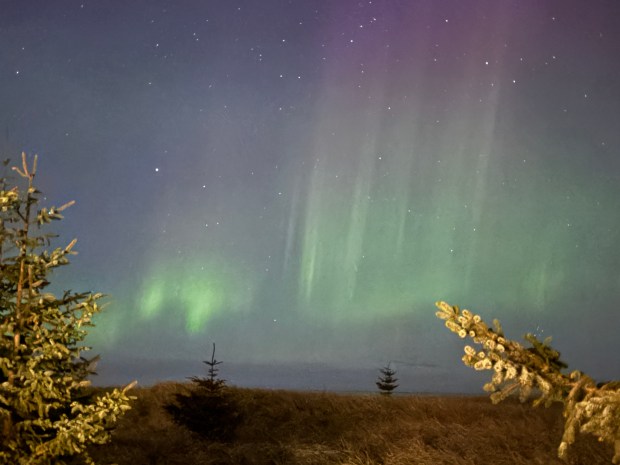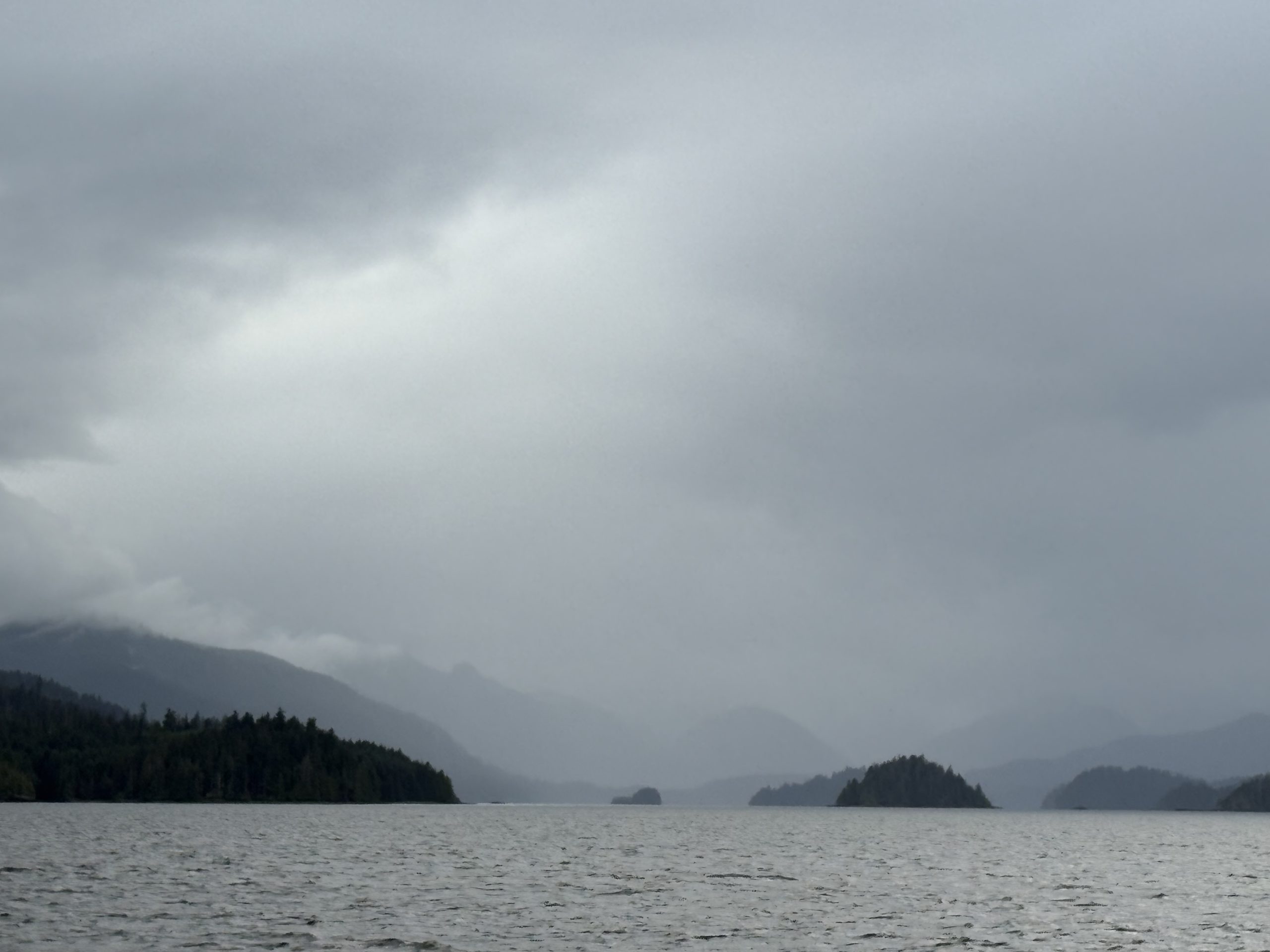
Last night.

This morning.
Share:

Crossing Skidegate Inlet, yesterday
We are working in Haida Gwaii this week. At the Haida House Lodge at Tllaal on the east side of Graham Island, there is a dictionary of Haida words collected from Skidegate dialect speakers over the years. Last night I sat on the covered porch while the rain came down off the Hecate Strait and a southeasterly lashed the side of our cabin. This morning I had a look in the dictionary and there are dozens of words and expressions for rain. My blog doesn’t have the ability to write Haida orthography, so I’ll share some of the translations:
- Fine rain
- Fine rain coming down
- It is raining so hard the water gets calm
- One drop of rain less
- Misty
- It is raining small drops; crying on the way
- Sprinkling rain
- Heavy or big rain that hits the water and bounces up
- Rain that calms the sea
- Rain drops here and there
- Rains too much and everything is damp
- Starting to rain
- Starting to rain hard
- Rain that cleans
- Rain that is hard and noisy
- Rain that is easing off.
- Rain shower that goes by
- Rain squall coming that darkens the sky
- It is raining so hard the droplets are sticking together
- Snow turning to rain
- The clouds keep rubbing
- The rain that is pouring straight down
Share:
It was about 30 years ago that I first saw the World Wide Web on my friend Chris Heald’s computer. We immediately grasped the potential of self-publishing and even had a short lived website called “Stereotype” because it had two writers. We posted editorial musings sort of in the spirit of Suck.com. It was a proto-blog and I learned how to code html which I used for my first websites. Netscape quickly became my browser of choice so I’m chuffed to celebrate its 30th birthday.
Lest we forget. 10 years ago Maclean’s published an article about how the federal government was purging its archives of data on social, economic and environmental trends. I remember this. They were at war against climate science, and anything that could identify the negative consequences of wealth inequality.
Do you matter at work? I take it for granted that people do want to matter, if not at work then in their personal lives. That they want to be able to effect a positive change on the world around them (and if they would rather influent a negative influence, they are suffering with sociopathy). Is mattering and belonging different? Does it matter?
I think it does. From a link in that article comes this quote: “we work not just to pay the bills but because we want to contribute something meaningful to society. The psychological effect of spending our days on tasks we secretly believe don’t need to be performed is profoundly damaging, “a scar across our collective soul”.” I think unnecessary meetings are like that too. Or worse, poorly designed but necessary ones.
RIP to Midnight, the humpback whale that was struck and killed by a BC Ferry in Wright Sound last week. That was part of the area we were visiting earlier this month where we encountered dozens of humpbacks, and 15 fin whales too. There are so many whales on our coast now. And so much boat traffic, including ferries to Prince Rupert and Alaska, cruise ships, LNG tankers and bulk carriers. Many of these ships use these narrow fjords. Wright Sound is the intersection of the Inside Passage and the Douglas Channel at the end of which lies the port of Kitimat. The confluence of waters makes it a rich feeding ground for whales and dolphins.
Share:

Lund harbour, taken last year, when the skies were clear of smoke and rain.
The little town of Lund sits pretty much at the end of the road near the northern tip of the Sunshine Coast. It was established by two Swedish brothers who opened a store in 1889 right on top of the historical village of Tla’Amin, from which the surrounding First Nation derives its name. It is a town that now sits surrounded by Tla’Amin treaty settlement land, and which is still very much a working port. There are a few fish boats, but mostly it caters to marine services and adventure tourism for people living on and visiting the outlying islands and nearby Desolation Sound.
It was rainy and smoky yesterday so instead of a planned hike into the mountains we canned blackberry jam in the morning and walked around Lund in the afternoon. Along the way we visited Ron Robb and Jan Lovewell at Rare Earth Pottery. We met these two about four years ago, and we have mutual friends. Over the years we have bought a piece or two from them, and today left with a tea bowl and mug. Ron makes tea bowls using the Japanese method of kurinuki rather than throwing clay on the wheel or building pots from coils. Kurinuki means “hollowing out” in Japanese. The potter begins with the shaping of a solid block of clay and then scoops out the centre and takes away clay until the final item is produced. The result is a unique piece that has arisen from stillness, rather than the motion of the wheel, and is shaped from emptying out, and that very much resonates with me.
It’s worth a visit to their gallery if you are ever in Lund, and perhaps you will even find them in one of the twice-annual kiln firings. But if not, there is a wonderful video of them firing a wood kiln in Earl’s Cove with two other potters.
From Ron and Jan’s place we wandered down to Finn Bay where the Tidal Art Centre sits in an old forestry station. The gallery is currently hosting a beautiful solo exhibit of the work of Donna Huber. Huber’s work is inspired by everything from Chagall to Inuit printmaking and it shows in her use of space and perspective.
To cap off our afternoon, I had a stroke of good luck. While shopping for a lemon at The Stock Pile, I spied a copy of Phil Thomas’s Songs of the Pacific Northwest on a display carousel. Copies of this book used to be very hard to come by, but it seems it has now been reprinted by Hancock House. There is a playlist on YouTube with all of these songs, many of them sung by Jon Bartlett and Rika Ruebsaat, of whom I wrote last week.
Share:

The view across to Ahgykson and looking over towards Comox which is completely shrouded by smoke.
It is smoky here as we enjoy our last day of holiday on the Tla’Amin lands north of Powell River. A big wildfire at Mount Underwood is burning along the Alberni Inlet on Vancouver Island. It is feeding smoke into the south-easterly breeze and funnelling it up Vancouver Island and across the Strait of Georgia, smack into the northern Sunshine Coast. This fire is dangerous and fast growing and I’m worried for my friends at Huu-ay-aht and Tseshaht and in Port Alberni and Bamfield. So far there are no dangers to structures, but power is out, the smoke is terrible and local governments and First Nations in the area have declared states of emergency. We’re expecting a few days of rain starting this afternoon which may help a little. We’ve been relatively free of smoke this summer, unlike a lot of Canada. But here we are.
My friend Tenneson Woolf shares some of his go-to questions for getting started today:
- what is the simple story here?
- What is the simple intent here?
- what is the outrageous intent here?
Simple and easy ways to begin an engagement with a new client and to find the top of mind necessity and purpose for the work. It’s hard for me to know how other consultants work, but he and I share a love of asking questions and letting the other speak. The stuff I hear in first few minutes with a new client is key to understanding how they see their situation coming into a new engagement.
A while ago I wrote about social media sites as enclosures, and that brought to mind the idea that it is a kind of feudal structure. Doc Searls names that today and proposes a way out with the release of a new kind of privacy contract for users and large entities called “MyTerms.” From his post this quote stood out for me:
“Freedom of contract enables enterprisers to legislate by contract and, what is even more important, to legislate in a substantially authoritarian manner without using the appearance of authoritarian forms. Standard contracts in particular could thus become effective instruments in the hands of powerful industrial and commercial overlords enabling them to impose a new feudal order of their own making upon a vast host of vassals.”
That quote is from Freidrich Kessler, a contract law scholar who wrote it in 1943.
Tottenham bottled a 2-0 lead against Paris St. Germain last night in the European Super Cup. We looked really good against the best team in the world for most of the match, but conceded two late goals and lost on penalties. Had we won I would have declared Spurs as champions of the world. Because we lost it’s just a pre-season friendly. I’m unabashedly partisan in these matters.
At any rate, it was good to see the new look that Tottenham will be employing this season under new manager Thomas Franck. A focus on set pieces, including long thrown from Kevin Danso (I love a long throw), a more balanced shape in defence, with a low block of five defenders which made it frustratingly hard for PSG to score. There was excellent communication on the backline, with the full backs not being afraid to mark their men out wide because there was always someone to slide into the inside channel behind them. This frustrated crosses, a number of which drifted into the centre of the box and were headed away by Christian Romero who had only one job. Palinha also looked good.
Going forward Kudus offers some lovely creative play, but we are going to need another decent attacking midfielder as James Maddison recovers from ACL surgery. I love watching this team, and hope they continue to look renewed and confident as they climb back into the upper echelons of the Premier League and make good account for themselves with the Champions League spot they won last year.

